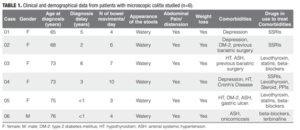HIGHLIGHTS
- Microscopic Colitis is a chronic inflammatory bowel disease causing non-bloody diarrhea. Several cases are undiagnosed and can be a hidden cause of chronic diarrhea.
- Treatment with budesonide MMX (Corament®, off label) was effective and safe.
ABSTRACT – Background –
Microscopic colitis (MC) is a chronic inflammatory bowel disease causing non-bloody diarrhea, and several cases are undiagnosed as a hidden cause of chronic diarrhea. Objective – We aimed to report the symptoms, delay diagnosis and the treatment of MC in a case series. Methods – All patients were treated at a Gastroenterology reference office from May 2022 to June 2023. Personal history including preexisting disorders, use of medications and smoking habits were collected. The delay between the onset of symptoms and the correct diagnosis was informed. All patients consented to use budesonide MMX (Corament®) off label. Results – During the study period, six Caucasoid patients were diagnosed with MC, five females and one male, between the ages of 65 and 74. All patients had comorbities and were taking multiple prescription drugs. Laboratory findings showed negative serology for celiac disease for all patients, normal levels of albumin and vitamin B12. The delay between the symptoms and the MC diagnosis varied from 2 months to 6 years. All patients had a previous diagnosis of irritable bowel syndrome. All patients were in complete clinical remission during the treatment and referred no side effects of the drug. Conclusion – Older females using high-risk medications are suggestive of MC. Preventing delay in the diagnosis of MC is crucial to improvement in patients´ quality of life. Budesonide MMX appears to be effective, safe and well-tolerated.
AUTORES
Lorete Maria da Silva KOTZE1, Luiz Roberto KOTZE1, Raquel Canzi Almada de SOUZA1, Paulo Gustavo KOTZE2 and Renato NISIHARA.


